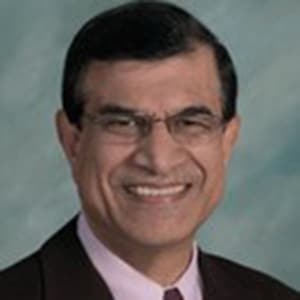
If you have just been diagnosed with a cancer in the head and neck region, you probably are trying to learn as much as you can about your condition, researching the best treatment options, and coping with your range of emotions. You may not be thinking about getting a good dental check-up, but you should.
One of the first referrals made for any patient whose treatment includes chemotherapy or radiation to the head and/or neck is the Maxillofacial Dental Oncology Clinic at UofL Brown Cancer Center. That’s because these treatments to the facial area may temporarily or permanently damage the saliva glands. A common side effect of radiation is dry mouth.
Saliva contains antibacterial components that fight tooth decay and gum disease. The lack of saliva opens the door for bacteria, often leading to severe damage to teeth and gums. Dry mouth can lead to other serious oral conditions in teeth, gums, salivary glands and jawbones. These side effects can hurt and make it hard to eat, speak and swallow, affecting your quality of life.
Our dental oncologist will meet with you to determine what effects the proposed cancer treatment will have on your mouth. The goal is to alert patients as early as possible to prevent any damage from occurring. Prevention is much more effective than trying to fix the problem after it occurs. After your initial consultation, we will contact your dentist to discuss the recommended course of treatment.
At UofL Brown Cancer Center, we strongly believe your dentist is an important partner in your treatment plan. Before your cancer treatment begins, your dentist may recommend special toothpaste, extra brushing and more frequent dental visits to monitor the situation.
Your dentist may also take the following steps:
- Identify and treat existing infections, problem teeth and tissue injury or trauma.
- Stabilize or eliminate potential sites of infection.
- Remove orthodontic bands if certain types of chemotherapy are planned, or if the bands will be in the radiation field.
- Evaluate dentures and appliances for comfort and fit.
- Perform oral surgery, if needed, at least two weeks prior to the initiation of radiation therapy to allow healing, and at least seven to 10 days before myelosuppressive therapy (treatment that inhibits blood cell production) begins.
- In adults receiving radiation, extract teeth that may pose a future problem.
- In children, consider extracting highly mobile primary teeth and teeth that are expected to exfoliate during treatment.
- Instruct patients on oral hygiene, use of fluoride gel, nutrition and the need to avoid tobacco and alcohol. We can provide you with options and recommendations, but your dentist will need to help you follow through.









